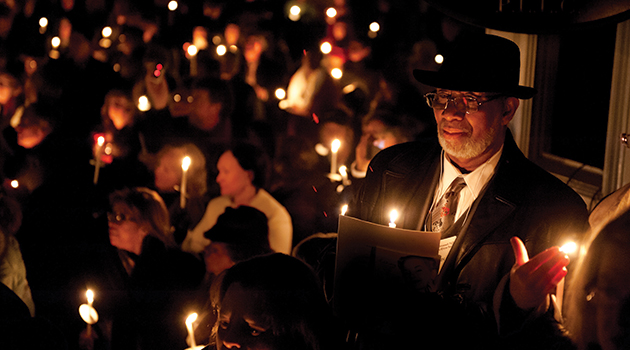African Burying Ground Celebration: Q&A With Stephanie Seacord

Since then, a robust community initiative, headed up by the Mayoral-appointed African Burying Ground Committee, has worked to acknowledge this history on many fronts, and to return the site to sacred ground.
Now their efforts are coming to fruition with a reburial service and public celebration. Starting with an on-site community event on Wednesday, May 20th with sculptor Jerome Meadows and ending with a performance by The Blind Boys of Alabama at The Music Hall’s Historic Theater on Saturday, May 23, “the Portsmouth community has found a meaningful and powerful way of honoring those buried beneath the street,” says Vernis Jackson, Chair of the ABG Committee. “These events are about remembering the dead and returning the remains to the earth, as well as acknowledging the site’s history and celebrating the community-wide effort that has made this project possible.”
The Music Hall, with its historic theater just a few steps away from the burial ground, has been “a proud community partner from the inception of this important project in Portsmouth,” says Executive Director Patricia Lynch, adding that “by acknowledging the mistakes of the past, and by celebrating the dignity of all people, we are sending a beacon of hope for the future.”
The following interview with African Burying Ground committee member and ad hoc public affairs counsel Stephanie Seacord, is the first in a series of interviews with three of the individuals who have volunteered their time and expertise to make this pioneering project happen.
Regina Baraban (RB): Why is the African Burying Ground initiative so important to the city of Portsmouth—and beyond?
Stephanie Seacord (SS): The Portsmouth African Burying Ground is not black history or white history; it is our history. Slavery happened here. Black people were buried in this then-isolated graveyard. Each had a name, a role, and a place in the community of their century. They are us. Therefore, if any of us are important to the city of Portsmouth and if any of us expects to be respected in life and in death in Portsmouth, those buried in the African Burying Ground deserve the same. Nothing more, perhaps; and certainly, nothing less. Beyond Portsmouth, NH, this is a demonstration of a core value our nation supposedly holds dear: “That all men are created equal and that we are endowed by the creator with certain inalienable rights.” The Portsmouth African Burying Ground is a re-commitment to that core value.
RB: What are ‘the don’t’ miss highlights of the weekend events?
SS: Each element of the memorial weekend—and it is so appropriate that these events are taking place on Memorial Day weekend—has a different tone. So each person will probably make an individual decision about which events resonate with their interests and which they will attend. The Portsmouth African Burying Ground is a personal space, for learning, remembering, and contemplating its truth and its symbolism. Some may choose to engage with the young schoolchildren and artistic elements orchestrated with sculptor Jerome Meadows on Wednesday or Saturday morning. Some may want to be a part of the solemn procession and re-burial. Some may want to dance the West African culture of release and joy at the Community Celebration. And some may want to sit quietly in the church during the Vigil for the Ancestors, or later, in the shade of the new memorial park and think about where this all started and where we’ve come.
RB: How has the African Burying Ground project made a difference to you personally?
SS: I attended the community meetings at the library in 2008, to learn about the re-discovery of the remains, the history of the Burying Ground, and to participate in the conversation about how this piece of Portsmouth history would be commemorated. That’s what we do in Portsmouth—remember, commemorate, and try to make the people and lessons of our history relevant today.
Soon after getting involved, I learned about the “Slave Petition of 1779,” which radicalized my understanding of those buried in this place, from one of pity and remorse to one of admiration for the individuals, enslaved and free Africans in colonial Portsmouth households, many of whom were buried here in unidentified but not un-marked graves. Now I try to imagine each of what may be 200 graves as a person who mattered. Some of the 17th and 18th century Portsmouth Africans whom we know by name may be buried here. Others we will never know, except for the unquestionable evidence of their bones, that they were here. I had to stand up for them and the injustice done to them and in the name of other nameless individuals to whom injustices are done. If only everyone would make the just and merciful decision to stand for those forgotten. Before they are forgotten. ♦
Click here for more information and a detailed calendar of African Burial Ground events.
Please join us at the Historic Theater on Saturday, May 23 at 7pm for the legendary, five-time Grammy-winning gospel group The Blind Boys of Alabama, performing in recognition of The African Burying Ground.
